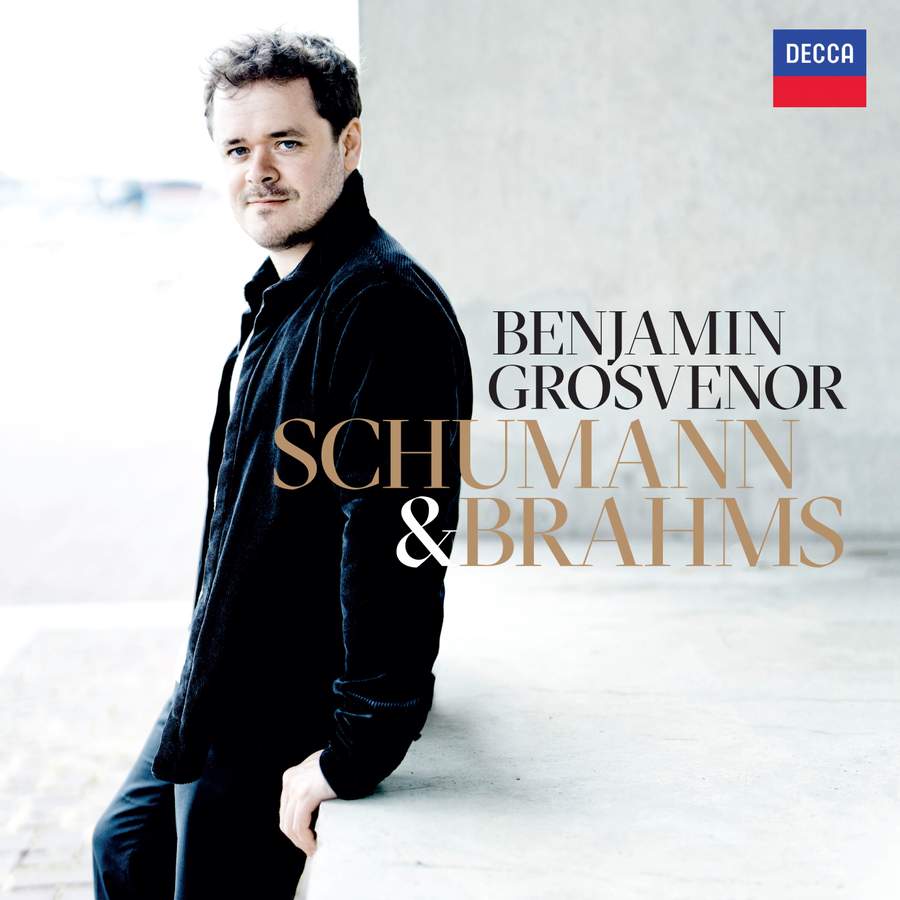Benjamin Grosvenor: Schumann & Brahms
View record and artist detailsRecord and Artist Details
Genre:
Instrumental
Label: Decca
Magazine Review Date: 04/2023
Media Format: CD or Download
Media Runtime: 86
Mastering:
DDD
Catalogue Number: 485 3945

Tracks:
| Composition | Artist Credit |
|---|---|
| Kreisleriana |
Robert Schumann, Composer
Benjamin Grosvenor, Piano |
| (3) Romanzen, Movement: F sharp |
Robert Schumann, Composer
Benjamin Grosvenor, Piano |
| Blumenstück |
Robert Schumann, Composer
Benjamin Grosvenor, Piano |
| Sonata for Piano No. 3, Movement: Quasi variazioni |
Robert Schumann, Composer
Benjamin Grosvenor, Piano |
| (12) Klavierstücke, Movement: Abendlied |
Robert Schumann, Composer
Benjamin Grosvenor, Piano |
| Variations on a theme of Robert Schumann |
Clara (Josephine) Schumann, Composer
Benjamin Grosvenor, Piano |
| (3) Pieces, Movement: No. 1, Intermezzo in E flat |
Johannes Brahms, Composer
Benjamin Grosvenor, Piano |
| (3) Pieces, Movement: No. 2, Intermezzo in B flat minor |
Johannes Brahms, Composer
Benjamin Grosvenor, Piano |
Author: Peter J Rabinowitz
In her excellent booklet notes, Katy Hamilton quotes Clara Wieck (still Robert Schumann’s fiancée) on Kreisleriana: ‘Sometimes your music actually frightens me.’ You might well share her apprehension if you listen to Josef Hofmann’s live performance (unfortunately abridged) from his Casimir Hall recital in 1938 – an impulsive, even feral reading that amplifies the music’s unruliness, most dramatically through its promotion of secondary voices (IPA, 3/77). At the other end of the interpretative spectrum, we have Arthur Rubinstein’s luxurious recording, which would surely have assuaged Clara’s anxieties (RCA, 12/70). Other pianists, of course, fall between these extremes but few hit the sweet spot as artfully as Benjamin Grosvenor.
To pick up on the word ‘sweet’: Grosvenor is rightly celebrated for finesse in Romantic music’s more private moments, and that sensitivity is plentiful here. The opening section of the second movement is representative. With its lovingly caressed phrases, its luminous sound and its daring (but totally convincing) stretching of the ritardando leading into the first Intermezzo, it’s the kind of playing that draws you in. The aching sense of yearning in the B section of the fourth movement (beginning at 1'49") will likewise leave you spellbound. More generally, throughout the performance, he’s acutely attuned to harmonic nuances, and he makes sure to give each repetition of a phrase a slightly different colour and flavour, managing to do so with such natural ease that it never sounds finicky.
Such warmth could easily tame the music. Miraculously, though, Grosvenor conveys the tenderness without erasing the strangeness – harmonic, rhythmic and formal – that apparently troubled Clara. Whether in his handling of the disorientating harmonies of the modulatory transition out of the second Intermezzo in the second movement (6'40") or in the shocking kick he gives the left-hand accents towards the beginning of the third (0'15"), or the canny way he navigates the music’s refusal to go where you expect it, he’s unerringly alert to the composer’s predilection for musical instabilities. As for sheer bravura: just listen to the stunning clarity of the fugal material in the seventh movement. There are plenty of worthy Kreislerianas out there, from Argerich’s to Vogt’s. Grosvenor’s can hold its own against any of them.
The rest of the repertoire is musically more disciplined. True, it’s not all as tender as ‘Abendlied’ (in Grosvenor’s own transcription) or the ‘Romanze’. But even when there’s a touch of desperation (say, in Blumenstück), these pieces largely avoid the white-hot intensity that surges up throughout Kreisleriana. Grosvenor captures their inwardness but does so without stifling their ardour or muting the music’s range of expression. Note the paradoxically gentle urgency with which he invests Clara’s second variation; the silken transparency he gives the harp-like seventh; the way he achieves a dreamy weightlessness in the second of the Brahms pieces without bleaching out his tone; and, best of all, the poignant longing with which he invests Robert’s Variations. Yes, as in Kreisleriana, tempo stretching can be extreme; but while you’re listening, this seems the only way to shape the music.
The engineering brings out all the colour and nuance of the playing. All in all, this is an album that reaffirms Grosvenor’s status as one of the most accomplished pianists around.
Discover the world's largest classical music catalogue with Presto Music.

Gramophone Digital Club
- Digital Edition
- Digital Archive
- Reviews Database
- Full website access
From £8.75 / month
Subscribe
Gramophone Full Club
- Print Edition
- Digital Edition
- Digital Archive
- Reviews Database
- Full website access
From £11.00 / month
Subscribe
If you are a library, university or other organisation that would be interested in an institutional subscription to Gramophone please click here for further information.




